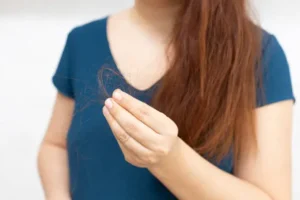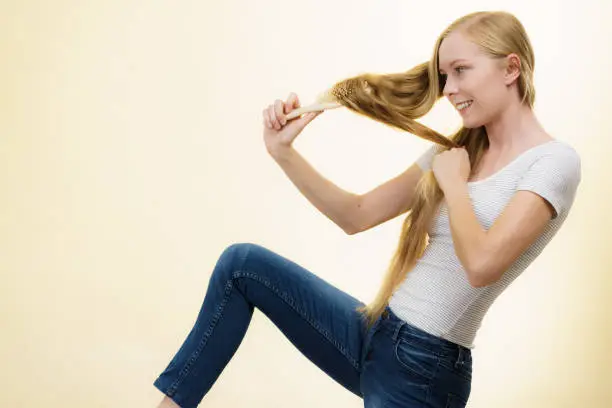5 tips for healthy hair
Healthy hair doesn’t happen overnight. Achieving and maintaining healthy hair involves consistent care, the right practices, and a healthy lifestyle. While there is no one-size-fits-all solution (since everyone’s hair is unique), there are key tips that can help keep your hair strong, shiny, and beautiful. Below are five essential tips to ensure the health of your hair.
Maintain a Proper Hair Care Routine
A consistent hair care routine is the foundation of healthy hair. This includes choosing the right products for your hair type, understanding your hair’s needs, and following good practices when washing, conditioning, and styling.
Shampooing Your Hair Properly
Shampooing is essential for cleaning your hair and scalp, but it’s important to do it correctly. Over-washing your hair can strip it of its natural oils, while under-washing can cause buildup.
- Choose the Right Shampoo: Select a shampoo that matches your hair type and concerns. For dry hair, opt for moisturizing shampoos. For oily hair, choose clarifying shampoos. Avoid products with sulfates, as they can be harsh and dry out your hair.
- Avoid Over-Washing: Washing your hair every day can lead to dry and damaged strands. Aim to wash your hair 2-3 times a week unless you have very oily hair. This allows your natural oils to nourish your hair.
- Use Lukewarm Water: Hot water can dehydrate the scalp and hair, making it prone to dryness. Instead, wash with lukewarm water to prevent stripping away natural moisture. Rinse with cool water to help seal the hair cuticle, making hair shinier.
Conditioning Your Hair
Conditioning is just as important as shampooing. A good conditioner helps maintain moisture and improves the texture of your hair. It ensures your hair stays hydrated, smooth, and shiny.
- Condition After Every Wash: Apply conditioner after shampooing to replenish moisture. For dry or damaged hair, use a deep conditioner or hair mask once a week for an intensive treatment.
- Focus on Ends: Apply conditioner primarily to the ends of your hair, where the strands are more likely to be dry. Avoid applying it directly to the scalp, as this can cause it to become greasy more quickly.
- Leave-In Conditioners: If you have very dry or frizzy hair, leave-in conditioners can help add extra moisture and protect against environmental stressors.
Be Gentle While Washing
Handling your hair gently while washing is key to minimizing breakage.
- Don’t Over-Scrub: When shampooing, avoid scrubbing your scalp too harshly. Gentle massaging is enough to stimulate blood flow without causing damage.
- Avoid Towel Drying: After washing, avoid rubbing your hair with a towel. Instead, gently pat or blot it dry. Rubbing can cause frizz and lead to hair breakage.
- Combing Wet Hair: Use a wide-toothed comb to detangle wet hair, starting at the ends and gradually working your way up. Wet hair is more fragile and prone to breakage, so detangle it carefully.
Avoid Heat Damage
Heat styling tools such as blow dryers, curling irons, and flat irons can give you the hairstyle you want, but they can also damage your hair if used too frequently.

Use Heat Protection: Always apply a heat protectant spray or serum to your hair before using any styling tools. Heat protectants create a barrier between your hair and the heat, reducing damage.
Lower Heat Settings: Keep the temperature of your styling tools on the lowest effective setting. Excessive heat can lead to split ends, dryness, and breakage.
Limit Heat Styling: Try to avoid using heat styling tools every day. Embrace heat-free styles like braids or air-drying to give your hair a break from the heat. 5 tips for healthy hair
2. Nourish Your Hair from the Inside Out
Healthy hair isn’t just about what you apply to it; it’s also about what you put into your body. Hair growth and strength are heavily influenced by your diet and lifestyle. Certain vitamins and minerals are essential for hair health. 5 tips for healthy hair
Eat a Balanced Diet
A balanced diet full of vitamins and minerals can promote healthy hair growth and prevent damage.
Protein: Hair is made up of keratin, a protein, so getting enough protein is essential for healthy hair. Include lean meats, fish, eggs, beans, lentils, and nuts in your diet.
Iron: Iron helps red blood cells carry oxygen to your scalp, which is vital for hair growth. Iron-rich foods include spinach, lentils, red meat, and tofu.
Omega-3 Fatty Acids: These essential fats help nourish hair follicles and promote healthy scalp circulation. Add fatty fish like salmon, flaxseeds, chia seeds, and walnuts to your diet.
Vitamins A, C, and E: These vitamins support the production of sebum (natural scalp oil) and help protect your hair from damage. Sources include carrots, citrus fruits, leafy greens, and nuts. 5 tips for healthy hair
Hydrate Your Hair and Scalp
Just like your skin, your hair needs hydration to stay healthy. Dry, brittle hair is more prone to breakage, so it’s crucial to keep both your scalp and hair hydrated.
- Drink Plenty of Water: Staying hydrated helps your hair follicles stay healthy and your hair strands retain moisture. Aim for 8 glasses of water per day.
- Moisturizing Products: Look for hydrating shampoos, conditioners, and oils to lock in moisture. Ingredients like shea butter, coconut oil, and argan oil are great for hydrating hair.
Avoid Stress
Stress can take a toll on your entire body, including your hair. Chronic stress has been linked to hair loss, thinning, and slowed hair growth.
- Practice Stress Management: Engage in activities that help reduce stress, such as yoga, meditation, deep breathing exercises, and regular exercise.
- Sleep Well: Getting enough rest is essential for hair health. Aim for 7-9 hours of quality sleep every night to help your body repair and rejuvenate.
3. Protect Your Hair from Environmental Damage
Your hair is exposed to various environmental factors that can cause damage. Pollution, UV rays, chlorine from swimming pools, and even weather conditions can harm your hair. 5 tips for healthy hair
Wear Protection from the Sun

Just like your skin, your hair can suffer from the sun’s UV rays. Prolonged exposure can cause color to fade, hair to become brittle, and the scalp to become dry and irritated.
- Hats and Scarves: Protect your hair by wearing a hat or scarf when out in the sun for extended periods.
- UV Protection Products: Use hair products with UV filters to protect your hair from the sun. There are sprays and serums designed to shield your hair from UV rays.
Minimize Chlorine Damage
Chlorine from swimming pools can strip moisture from your hair, leading to dryness and discoloration.
- Wet Your Hair Before Swimming: Before entering the pool, wet your hair with clean water. This minimizes the amount of chlorine your hair absorbs.
- Use a Swim Cap: If you swim often, consider wearing a swim cap to protect your hair from chlorine exposure.
- Shampoo After Swimming: Rinse your hair immediately after swimming to remove chlorine buildup. Follow up with a deep conditioning treatment to restore moisture.
Prevent Hair Damage from Wind and Pollution
Wind and environmental pollution can cause your hair to become tangled, frizzy, and brittle.
- Use Anti-Frizz Products: Apply a lightweight anti-frizz serum or smoothing cream to keep hair protected from the elements.
- Cover Your Hair: On windy days, try wearing a loose braid or bun to keep hair from getting tangled and damaged.
4. Get Regular Hair Trims
Even if you’re growing your hair out, regular trims are essential for maintaining healthy hair. Trimming your hair every 6-8 weeks prevents split ends from traveling up the hair shaft and causing further damage.
Trim to Avoid Split Ends
Split ends can lead to breakage, making your hair appear unhealthy. Regular trims will keep your hair looking fresh and prevent these issues from getting worse.
- Trim Every 6-8 Weeks: Even if you’re trying to grow your hair, trims will help ensure your hair stays healthy and strong.
- Trim Based on Hair Growth: If your hair grows faster, you may need to trim it more often. If your hair grows slowly, you can extend the interval between trims.
5. Avoid Hair Damage from Styling Tools and Chemicals
Chemical treatments like coloring, perming, and bleaching can weaken your hair. Additionally, overuse of styling tools can result in heat damage and split ends.
Minimize Chemical Treatments
Hair color, bleach, perms, and relaxers can alter your hair’s structure, leading to damage. If you choose to use these treatments, do so sparingly and use the right aftercare.
- Go for Gentle Alternatives: Choose semi-permanent dyes or more natural alternatives if possible.
- Deep Condition After Chemical Treatments: Always deep condition after any chemical treatment to restore moisture and repair damage.
Limit the Use of Hot Styling Tools
Hot tools like flat irons, curling irons, and blow dryers can weaken your hair if used too often.
- Use Low Heat Settings: If using styling tools, choose the lowest heat setting that still achieves your desired look.
- Opt for Air Drying: Embrace air-drying your hair whenever possible. If you must use heat, consider investing in heatless curlers or other alternatives.
FAQ:
How often should I wash my hair?
The frequency depends on your hair type. For most hair types, washing 2-3 times a week is ideal. Oily hair may require more frequent washing, while dry hair benefits from less frequent washing to retain moisture.
What should I do if my hair is falling out?
Hair loss can be caused by various factors, such as stress, poor diet, or medical conditions. If you’re concerned about hair loss, consult with a dermatologist to identify the cause and discuss potential treatments.
How can I prevent frizz?
To prevent frizz, use anti-frizz serums, avoid over-washing your hair, and minimize heat styling. You can also use a silk pillowcase to reduce friction while sleeping.
Can I reverse hair damage?
While you can’t fully reverse damage from heat, chemicals, or environmental factors, you can restore moisture and prevent further damage by using deep conditioning treatments, minimizing heat exposure, and trimming regularly.
What are the best vitamins for hair growth?
Biotin, vitamin D, vitamin C, and omega-3 fatty acids are essential for healthy hair growth. A balanced diet full of fruits, vegetables, and protein-rich foods will also support hair health.

